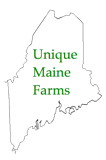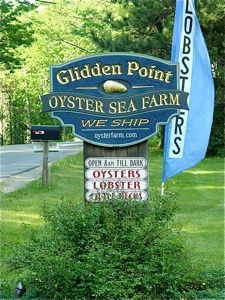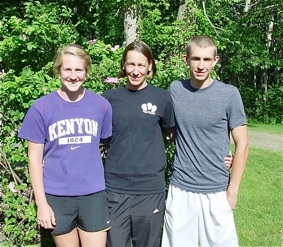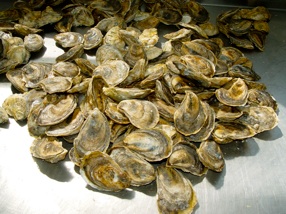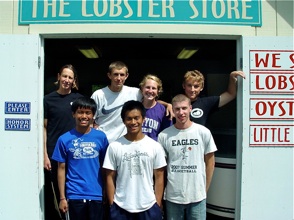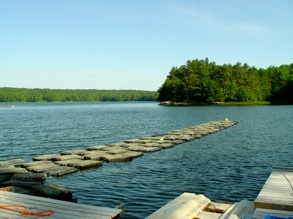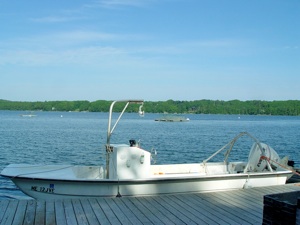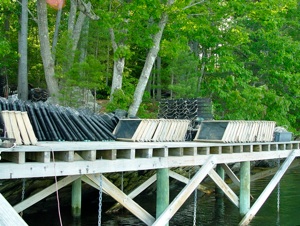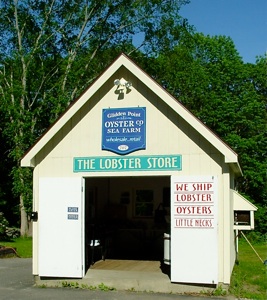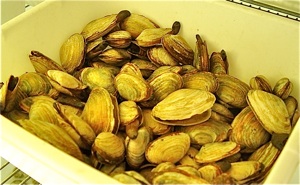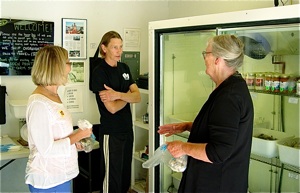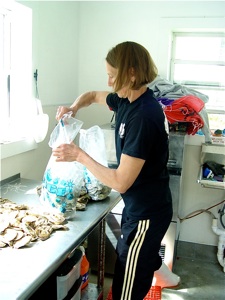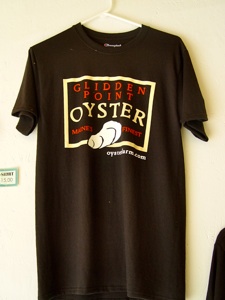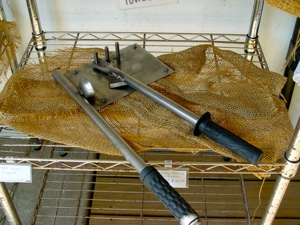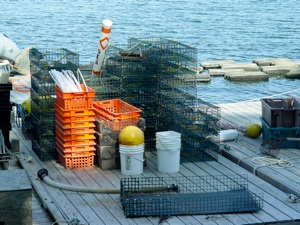Name: The Lobster Store
Address: Barbara Scully
The Lobster Store
707 River Road
Edgecomb, Maine 04556
Phone: 207-633-3599
Website:
Email: lobsterstore@gmail.com
Facebook: www.facebook.com/thelobsterstore
Products and Services:
-fresh-in-the-shell oysters
-raft-purged steamers
-littleneck clams
-select hard-bottom lobsters
-shucking knives and gloves
-gifts
-condiments and ice
-shipping services
What Makes The Lobster Store Unique?
You may have heard people talk about the “old-fashioned Maine work ethic.” There is no question that Barbara Scully, her two children, Morgan and Benn, and the crew at the Glidden Point Oyster Farm in Edgecomb, have exhibited a most incredible work ethic. Their oyster operation is managed with very precise and environmentally-conscious methods. Treating customers with a sense of fairness and honesty is always a priority. Glidden Point Oyster Sea Farm could easily be included in a listing of some of the hardworking, highly-respected and long-established traditional enterprises that set Maine apart in the world of farming.
Barbara’s mastery of marine studies, her good business sense, and her many years of experience with oysters have drawn national attention. She, unlike many oyster farmers of today, is committed to harvesting oysters exclusively by hand by diving for them. No machinery or processing equipment is used. Technology; however, has been embraced for marketing and sales, as evidenced by the business’s healthy wholesale accounts and brisk online ordering.
2013 marks the twenty-sixth year that Barbara Scully has been raising oysters. She graduated with a degree in zoology from the University of New Hampshire and focused her training and independent research on marine organisms. After earning a Masters in Science Education, she worked for twelve years for the Maine Department of Marine Resources. During those twelve years she spent weekends and evenings growing oysters. She purchased small seed oysters and grew them until they reached an appropriate size to be planted in an approved site that she leased from the state. In 2001, she retired from the state position and focused all of her efforts on the oyster farm.
Once plentiful in the Damariscotta River, the population of wild oysters became depleted. A new aquaculture industry was created in the 1970’s that attempted to commercially raise oysters. Barb has four ten-year leases to harvest oysters in four different locations in Newcastle, Bristol, South Bristol, and Edgecomb. The lease sites range from twelve to forty-two feet in depth. Barbara explained that each of the sites vary in their substrate and possess their own unique qualities. Barbara studies potential sites and analyzes them for water temperature, food quality and availability, circulation, and if they are compatible with the recreational and commercial activities in the area.
Glidden Point Oysters have garnered many awards over the years and are sought by world-renowned chefs. Barbara explained that the oysters that are grown at Glidden Point Oyster Sea Farm are known for their uniform size and shape, deep shell cup, plump and firm meat, freshness, and quality. She said, “Their flavor is distinct and complex- briny yet sweet.” After the oysters are harvested they are placed in a wet-storage float to purge any grit. The clams that Glidden Point sells are also raft-purged.
The philosophy of the Glidden Point Oyster Sea Farm differs from most oyster farms that rely on a great deal of equipment. She believes in the value of raising oysters in a much more time-consuming, hands-on manner. She feels good about the fact that the teens who work for her learn about reliability and responsibility and are given the opportunity to perform meaningful work while learning self-reliance and marine ecology. She explained that she places her trust in these young adults to do a good job and the result is an exciting, high energy work environment. She also values hiring students in a rural area and supporting the local economy. She purchases the clams, littlenecks, and lobsters that she sells in her store from local fishermen.
There is a great deal more to oyster farming than most people realize. It took Barbara twelve years to figure out how to farm oysters so that her efforts actually produced enough revenue to be the sole source of income to support her family. The six or seven teens, in addition to Morgan and Benn, who are employed at the farm, help to cull, sort, wash, and pack the oysters, scrape the barnacles, seed the farm, run the retail store, and repair the equipment. The season for raising and harvesting the oysters takes place from April through November and the long hours could easily translate into periods of exhaustion for people without extraordinary stamina. Barbara does all the diving for the oysters and appears to be in top-notch physical shape. For those who knew her in college, this would probably come as no surprise since she earned a minor in exercise physiology!
Various challenges can arise in oyster farming. Parasites can cause disease. Predators can wreak havoc. Storms can damage equipment. One year Barbara lost ten million oysters, which was ninety percent of her inventory. It takes three years to grow oysters to market size, so when something goes amiss, three years is a very long time to correct a mistake or a loss.
The middens (shell heaps) from the Native Americans who lived and traveled by the Damariscotta River are described. Visitors to the website can obtain information about shucking and storing oysters, shellfish safety, serving suggestions, red tide, and the difference between wild and cultured oysters. Various examples of the role that oysters have played in history and literature are shared. Questions, such as, “Are oysters aphrodisiacs?” and “Do the Glidden Point oysters have pearls?” are answered. The myth about eating oysters all in the months that contain the letter “r” is also discussed.
Anyone who has the opportunity to job shadow Barbara Scully might reconsider any idea of starting an oyster business! She usually awakens around 4:30 a.m. She checks and prepares orders, stocks the store, replenishes supplies, arranges deliveries, works on the water, keeps the store open until 8 p.m. each night; and then tackles paperwork until around ten o’clock. Barbara has had additional challenges due to being a single parent and a breast cancer survivor.
Glidden Point Oyster Farm does a brisk wholesale business with clients in upscale restaurants in Boston, New York, and Philadelphia and in cities throughout the country. Barbara drives a refrigerated truck with oysters to a freight company that ships the oysters to many locations. She also supplies many local restaurants. For the retail orders that need to be shipped, she places the oysters or clams or hard-shelled lobsters in insulated boxes that are picked up by Fed Ex and shipped overnight.
At The Lobster Store, that is located on the Scully property, retail customers can stop by to purchase oysters, clams, lobsters, and gifts (such as Glidden Point tee shirts and hats, shuckers for oysters or clams, oyster gloves, lobster crackers, shucking aprons, horseradish and cocktail sauce) every day from 8 a.m. to 8 p.m. Two picnic tables are set up for customers who wish to shuck the oysters that they purchase.
Rowan Jacobsen, the author of The Oyster Guide, is quoted as saying, “Glidden Points stand out on raw-bar lists for their size, crispness, brine, deep cup, and rock-hard shells. What I always notice is their weight. Hold a Glidden Point in one hand and a different oyster in the other and you will immediately notice the heft of the Glidden Point. Both the shell and the meat have a density that comes only from slow growth in cold water.”
Glidden Point Oyster Sea Farm is flourishing.
Spend a little time with Barbara Scully and you will observe her waiting on one retail customer
after another, filling wholesale and online orders, and replenishing stock. The work ethic, the
fair and honest way of conducting business, and the refined methods of growing oysters have drawn a fan base from all over the world. Barbara explains that she has loved living in Maine and working side by side with her children. The lifestyle she has created has provided some flexibility so that when her children are competing at various sporting events and participating in school activities she can be there to support them. It seems Barbara Scully has established an environmentally-responsible business and an exceptional work ethic that has translated into quite a success in the agricultural world of sea farming.


